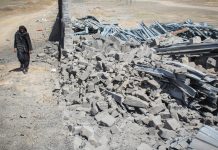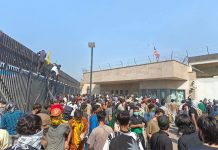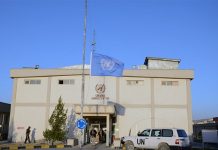Collective punishment is more often considered as physically hurting a group of people for someone else’s wrongdoings. This has been a common occurrence in erstwhile FATA (Federally Administered Tribal Areas), where whole villages were punished whenever Pakistani forces were targeted by the insurgents. The locality nearest to the site of attack would have to bear the brunt of Pakistani military’s retaliation. Those punishments, whether in the form of publicly beating and humiliating the villagers or demolishing their houses, were all carried out under the draconian laws of FCR (Frontier Crimes Regulations).
In Balochistan, it looks like security forces do not need such a law to burn entire villages. There have been several reported instances, where entire villages have been burnt or razed off during military operations in Balochistan.
However, physical damage is not the only kind of collective punishment that people of Balochistan suffer from. Whenever a person goes missing—a euphemism used for enforced disappearances allegedly carried out by security agencies—the mental trauma for the family of ‘missing person’ is so harsh that they never come out of it. It is a common spectacle in Balochistan where family members of such unfortunate people spend days and nights protesting in the camps set up for the release of their loved ones. Many parents have perished waiting for the return of their loved ones.
Tragically, parents of such three missing persons have passed away only in the previous week. All of them have been waiting for more than five years to see their children, one last time.
Ilahi Bakhsh Baloch passed away on 19th April, he died whilst waiting to see his son Zahid Kurd. Zahid was the Ex-Chairperson of a student organization BSO-Azad (Baloch Students Organization). He was abducted on 18th March 2014 from Quetta city, reportedly by Pakistan army. He remains missing to date.
Two days later Mother of missing Jan Mohammad left the world on 21st April. Jan Muhammad Baloch was abducted from Burma hotel in Quetta on 26th July 2015. His mother continuously sat for his release in the protest camps and finally passed away without seeing her son.
Imran Gurgunari is missing since February 2010 when he was abducted along with 21 other people during a military operation in Tootak town of Khuzdar district. His father, Gamar khan, passed away on Monday whilst waiting for his son who remains missing as the decade comes to a close.
Earlier in the month, Mah Ganj Baloch, an elderly woman, passed away, her son Ghulam Farooq was never returned to her.
These tragedies have arisen in the last few weeks only. There are many other cases that never make it to the media and families suffer in silence as a result of this psychological collective punishment.
This collective punishment needs to be ended at the earliest as the mental trauma is too big for the families of the missing persons, Even if the so-called missing persons have committed any crime, their families must not be punished as well. Their miseries can be lessened to a huge extent if only the missing persons are produced in the courts and their crimes, if any, are proved through fair trials.






























